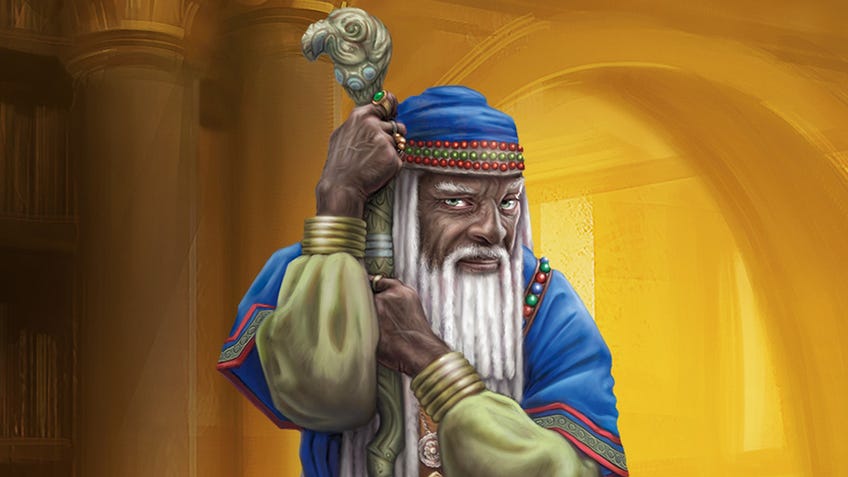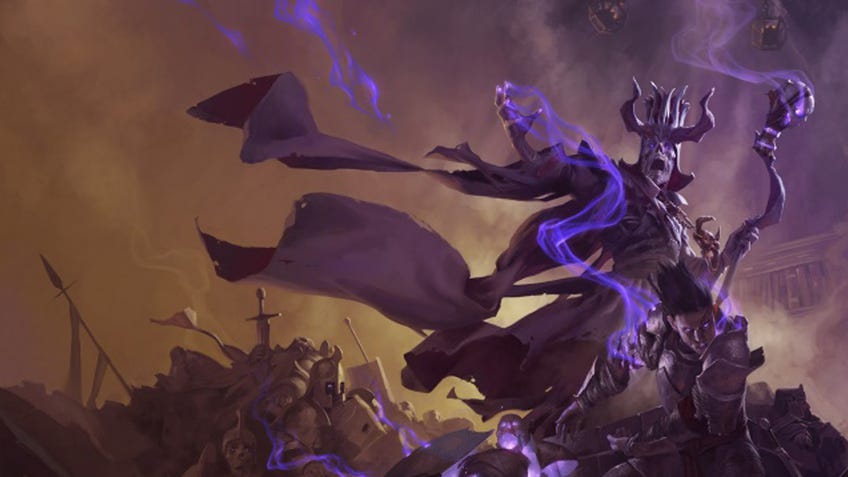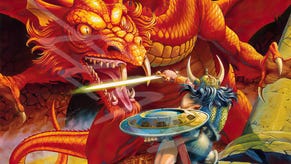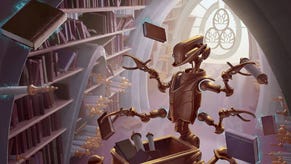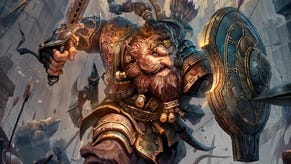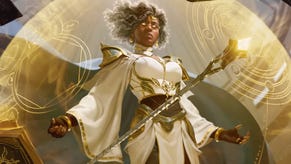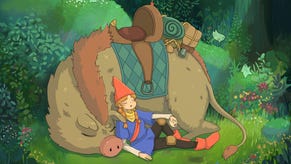Dungeons & Dragons 5E wizard class explained
How many spells, and what to cast - we’ve got everything you could ever wand.
Wizards are the ultimate magic users in Dungeons & Dragons 5E, with access to the most varied spells of any character class. Wizards can do an awful lot of stuff - like see the future, hurl fire or animate teapots. The sheer force of their power is bonkers.
Picture this: a monstrous bird swoops down from the cliff. Beneath it, a small wizard cowers. At the last moment, she places her hand on the beast’s beak - and turns the behemoth into a tiny mouse.
Somewhere else, a young mage brings a crowd of knives to life. With a wave of his wand, 30 blades coalesce as a swarm and speed towards their target.
Trapped inside a deep, dark mountain, an old caster places their hands on a vast stone wall. The surfaces shift and shape beneath their grasp, opening up a portal.
Above all else, what binds wizards is a love of knowledge. It lures them out from hiding. With the right training, these folks can shoot fire out of their hands, get visions of the future or hop between the different planes of the multiverse.
The darkest of these magic users can become immortal Lich Kings (once the required sacrifices have been made), and shape the very fabric of reality.
Unlike sorcerers (whose magic runs through their veins), most wizards have worked hard for their craft - learning how to weave the underlying magic that permeates the cosmos.
They are known to hole themselves up in towers and dungeons, to better practise their craft uninterrupted. It’s probably why so many inevitably go insane and create horrifying dungeons.
In this guide to the wizard class in Dungeons & Dragons 5E, we’ll be looking at everything you need to create a wizard character, including the different schools of magic, the 101 of building a wizard and how spellbooks work.
How to create a wizard character in D&D 5E
When creating your wizard, the main thing to work out is their relationship to magic. Wizards are essentially the sum of their spells. They can do pretty much anything, and rely on their intellect to do so. They are the class of raw mental power - unlike the warlock (as you’ll know from when we explained the warlock class) and sorcerer classes - who draw magic from their charisma.
So first things first, the wizard skillset likely means that your character has a bit of an unusual job, like in the military or academic research. That said, plenty of wizards end up in admin, bureaucratic and petty criminal roles, so there’s no need to play someone super wild. Or indeed, even that competent.
Why did you get into magic in the first place? Maybe it fascinates you, or you desire something attainable through no other means. There’s also the question of how you got into magic. Did you study at wizard school, like Harry Potter at Hogwarts, or learn your magic via more nefarious means?
Odds are, you’re pretty eccentric. You’ll have spent a lot of time studying and experimenting. Because the array of spells on offer is so huge, you could have picked up your skills for all sorts of reasons. Maybe you learned how to build a fire out in the wilds, or picked up an illusion or two because you traveled with performers.
Being able to shoot fire out of your hands might also lend you a unique perspective on the world - for better or for worse. Much of being a wizard is a question of what you’ll do with your powers.
The source of your magic is your spellbook. This grimoire can look and feel however you’d like. As mentioned previously, you get a lot of spells. But you’ll only be able to pick a certain amount to use each day. Therefore, planning as a wizard is also important. Be prepared for plentiful admin.
What are the eight schools of magic in D&D?
At second level, all wizards get to choose an Arcane Tradition. These are the different schools of magic found across the multiverse. In Dungeons & Dragons 5E, here are 10 official wizard schools in total. These range from casting illusions to literally raising the dead. Your choice will grant you special abilities and spells unique to each school, with new powers arriving at different levels.
School of Abjuration
For those who want to ward, banish, block and protect. Followers of this school can weave magic to protect themselves and other folks. These wizards are sought out when something bad happens, like a possession; or an interdimensional portal appearing.
School of Divination
Effectively a seer wizard, these guys can warp time and see the future. Immediately, you’ll be able to roll two dice every day and record their numbers. Later, you can replace any roll made by yourself or any creature with one of those die. You have to decide to do it prior to the roll itself. At later levels, you’ll be able to see things beyond that of standard sight. Spooky.
School of Necromancy
This is the school for people who wish to manipulate the forces of life and death. Not only can these dark wizards steal life force, but they can also literally summon undead to do their bidding. One of the darker magic schools.
School of Conjuration
As you’d expect, this subclass is great at conjuring things straight out of thin air. It’ll let you make objects out of magic, and teleport across the battlefield. It’s a fun one for summoning demons, elementals and other horrors from distant plains.
War Magic
This is the school of magic training wizards for battle. These war mages learn all sorts of tricks useful on the battlefield. These include skills that increase their power and even grant them protection. If combat is your thing, this is the wizard class for you. Find it in the Xanathar's Guide to Everything D&D sourcebook.
School of Transmutation
One for the physics nuts, this is the wizard class that manipulates matter. Perfect for anyone who wants to shape the elements.
School of Evocation
This is the class best suited to characters that want to wield destructive force. It lets wizards make safe pockets against the big area-of-effect spells, and additionally makes your own spells bigger and nastier.
School of Illusion
Ideal for charlatans and magicians, these wizards craft illusions to both beguile and terrify. You’ll be able to cast all manner of apparitions, manipulate them, and at later levels, craft entirely illusory worlds.
School of Enchantment
One of the more social wizard traditions, the School of Enchantment specialises in manipulating people. You’ll be able to do things like use your gaze to hypnotise and enthrall people, divert enemy attacks and even alter the memories of your foes.
Bladesinger
Specific to the elven races, these wizards have mastered the art of swordplay as well as magic. This class grants you decent armor and proficiency with a weapon. You’ll also get Bladesong, a secret elf song that grants you all sorts of wild advantages in battle. Like a melee fighter, you’ll also get a second attack later down the line. Check out this arcane tradition in the Sword Coast Adventurer's Guide D&D sourcebook.
How to play as a wizard in D&D 5E
Wizards are smart folks. As such, your character will be based on INT and WIS. This is because WIS makes you a little more perceptive, and able to resist spells better.
Being smart means you’ll be good at a lot of things related to learning, like investigation, languages and reading. You’ll be curious about your surroundings, and notice things that others might not.
As well as wizards having access to some really nasty brute-force damage spells, like the infamous Fireball spell, they can also sport a surprising amount of utilitarian spells handy for adventuring.
Spells like Identify and Mending let you know what things are, and how to fix ‘em. The irony of this is that sometimes the party’s most powerful magic user also becomes its de facto handyman. This also means wizards are good at making things.
That said, a lot of wizard spells are just plain bonkers. Like the spell Animate Objects, which ensures you’ll never look at a salad fork the same way ever again.
In terms of combat, whatever subclass you pick, you’re best off near the back of the fight. Wizards are the classic glass cannon. They hit hard, and they are fragile. Any wizard that hurtles to the frontline wielding a stick or small dagger is a dead one.
Wizards ought to shape the battlefield from afar, and also play a hand in preparing it to the party’s advantage.
In addition, you’ll be juggling your concentration spells in battle. Do you pick the thunder spell that does ultra-damage, maintain your fellow party member’s invisibility or keep your enemies at bay with a forcefield?
Preparation, in general, is key to this class. This is because you get to pick your spells out at the start of the day. Therefore, it’s best to approach things situationally. Darkvision and Spiderclimb might be handy for a dungeon crawl, but just plain inappropriate for a day out shopping in town.
How many spell slots and cantrips does a wizard have in D&D 5E?
From the first level, a wizard starts out with three cantrips and two spell slots. You also have a spellbook, which allows you to pick what spells you’re putting into those slots from a variety. The number you get to pick from in total is your intelligence modifier (e.g. +4) and your wizard level combined.
So a first-level wizard with +2 intelligence would get a total of three spells to start with. When they (hopefully) reach level two, they can add one more spell to their book. If your intelligence is low, don’t fret. You’ll also get two new wizard spells to add every time you gain a level, regardless.
You can’t just pick any spells though. You’ll have to pick the wizard spells available for your level.
In addition, wizards get arcane recovery - which allows them to recover spell slots quicker. This helps ensure you don’t burn out your big spells before the day really gets going.
You might also find spells out and about during your adventures via scrolls and other magic items. With the required time, you can also scrawl these down into your book for keeping. Last, there are some spells that can be cast as rituals, meaning they don’t use up a slot.
What can wizards do in D&D?
Wizards can do basically anything. Want to raise the dead? Learn necromancy. How about teleporting around whenever you please? School of Conjuration for you. Want to eventually create your own literal plane of existence? Get eight-level spell Demi-plane. Also, you can get your own familiar or homunculus. Maybe a winged cat that reads books for you? Who knows what delightful abominations you could summon together.
First off, as a wizard, you get all a spellbook which gives you access to spells. On top of this, you’ll pick your school of magic at level two, which will grant you additional spells and abilities unique to that school as you level-up. You’ll also get boons that let you power up certain spells of your choice.
Particularly wild wizard spells include Maze, which lets you banish something to a labyrinthine demi-plane of horror; Magnificent Mansion, wherein you conjure up a very cozy interdimensional dwelling; or Reverse Gravity, which does exactly what you’d expect.
In essence, don’t play a wizard if you just want to hit things. Or indeed, heal things. That’s their big gap, magic-wise. (If you’re after that, why not have the pros of D&D 5E’s fighter class explained to you?)
And while they are one of the more intense Dungeons & Dragons 5E classes in terms of admin, wizards are also one of the most rewarding. You can do so many strange and unusual things.
How to create a D&D 5E wizard character
As a wizard, you’ll want INT to be your highest stat as you make your Dungeons & Dragons 5E character, as it directly affects how likely your spells are to hit. Following this, pick constitution or dexterity. Constitution will up your (usually meager) hit-points, while dexterity will increase your odds of dodging out of the way. Unless you opt to be a wizard of illusions, in which case you’ll want high charisma to pull off those performance flourishes. Otherwise, feel free to make either charisma or strength your dump stat.
Also, as a squishy magic-user with limited access to good armor, you’ll want to rely on magical means to buff yourself up. If there’s going to combat in your campaign, get the Mage Armor spell immediately. Remember to cast it at both breakfast and dinner.
In terms of starting cantrips, detachable ghost appendage Mage Hand is a classic (and ripe for japes), and damage dealers like Ray of Frost and Firebolt give you some bite in combat.
What are the best wizard races in D&D 5E?
As per usual, humans make excellent wizards due to their versatility. Gnomes (the inventors and engineers of the D&D world) are also a good choice, as they start out with a nifty +2 intelligence bonus.
In addition, tieflings (half-demon folk) also get an intelligence boost, and some fun hell-themed racial abilities. The fearsome hobgoblin too, not only gets a +1 intelligence boost but also proficiency with martial weapons. No pointy stick for this wizard.
Lastly, high-elves and half-elves show tons of wizarding potential based on their inherent magic-ness and smarts. They pack great racial boons like dark vision and extra strong defenses against certain types of magic.
If you’re still unsure which is best for you, have a peruse of our guide on how to choose the right character race in Dungeons & Dragons 5E more generally and go from there.
Should I play a wizard in D&D 5E?
If you want to shape the world to your whims, then yes, you should play a wizard. It’s a class that suits folks who value imagination and ingenuity. Folks who enjoy creative problem-solving. Players who go home at night and wonder which of their spells could fix the bind you’re all in.
Wizards are not so much for D&D players who want to duke it out in combat (although they do get a delightful array of massive spells like Fireball), or do the bulk of the social work. Wizards are the D&D class for folks that love bright ideas.
They’re always searching, on a quest for knowledge. Driven by the unknown. Curious, often to a fault. If that sounds like you, and you’re cool with doing the extra admin that comes along with having vast unknowable powers, then wizard is the D&D class for you.
We hope you enjoyed learning the way of the wizard. If the class isn’t resonating with you, don’t worry! There are plenty of other magic users (and non-magic users) to check out - sit back, relax and have the Dungeons & Dragons 5E classes explained to you before making your final decision. After all, a charisma-based sorcerer or a warlock might be more your style, or you can enjoy beefiness with additional magic as a cleric, druid or paladin.
